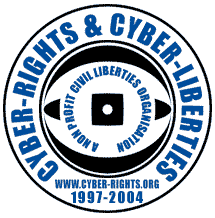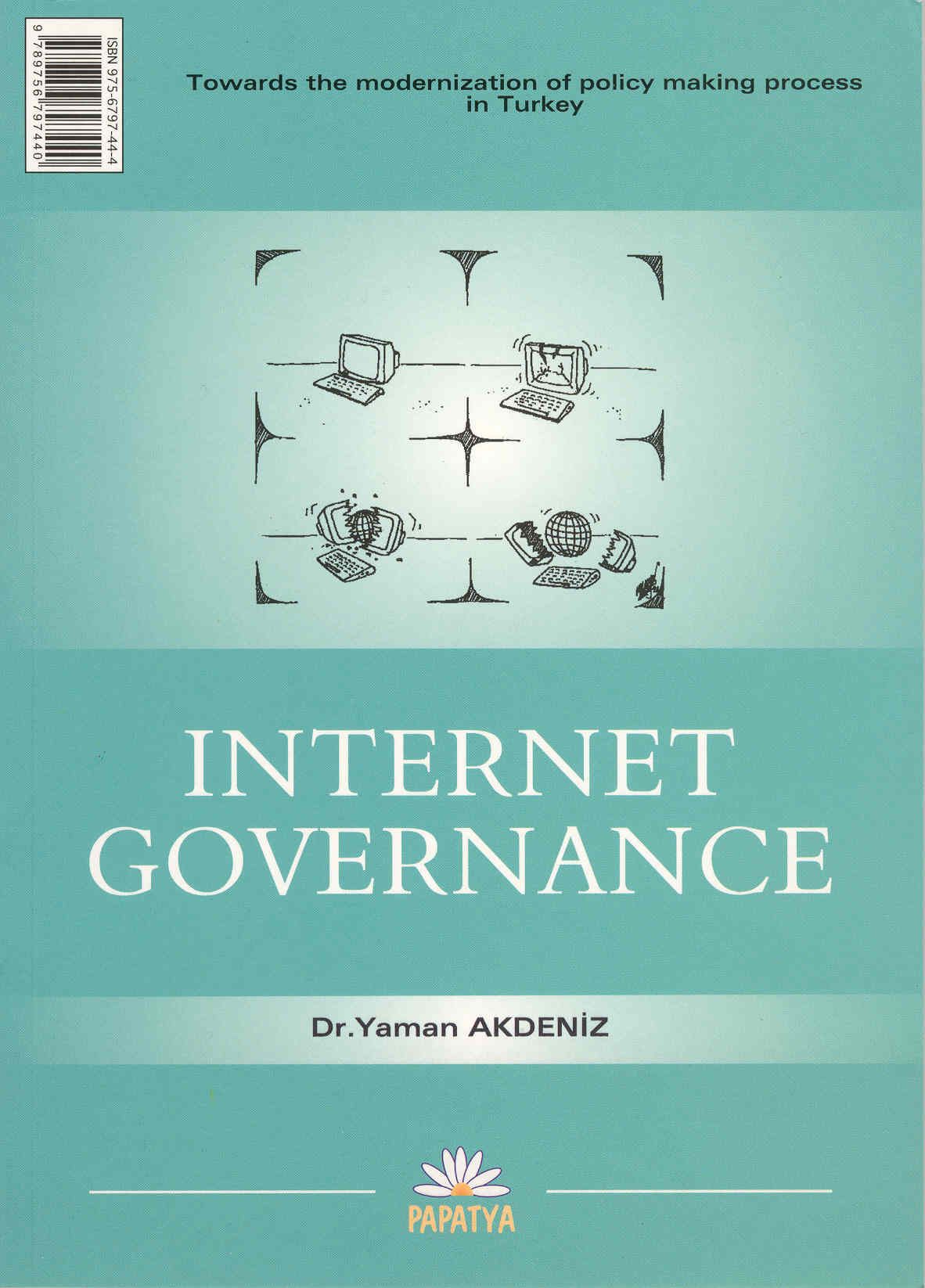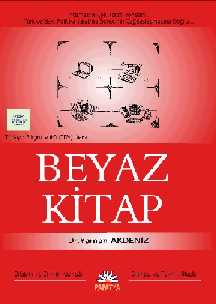| International
Policy Fellowship 2003-04 Project: By Dr. Yaman Akdeniz, LL.B., MA, Ph.D Lecturer in CyberLaw, University of Leeds, United Kingdom. Director, Cyber-Rights & Cyber-Liberties (UK), and a 2003 Fellow of the International Policy and Information Policy Fellowship programmes of the Open Society Institute. See also my IPF Continuing Fellowship 2005-06 Project entitled A Critical Assessment of Freedom of Information in Turkey |
Dr. Yaman Akdeniz's Curriculum Vitae is accessible here
Mail Correspondence Address:
School of Law, Faculty of Law, University of Leeds,
Leeds LS2 9JT. |
|
Project Timetable
Project Mentors
2003 Fellowship Final Report
Pages last updated: A presentation related to the project is provided as a PDF file. |
Research ProjectThe fellowship project will examine and analyse the developments and models and modes of governance in Turkey. This initial investigation will lead into the building of a civil society movement working in the field of law and policy issues involving e-democracy, human rights and the Internet in Turkey. The project takes as its theme Internet governance and how new communications technologies such as the Internet affects nation-state policy making and how nation-states foster policies related to the Internet. There may be different approaches to the growth of the Internet in different societies and the impact of the Internet on different nation-states may have different results. Different nation-states present a different level of economic development, respect for rights, trans-nationality, and technological sophistication. While Turkey is at a developing stage with respect to the Internet, others may be far more sophisticated with regards to Internet access, use, and penetration. Inevitably, the level of policy making process and nation-state approaches to Internet governance will be in different stages with different priorities. A multi-layered approach to Internet governance will be adopted throughout the project in the light of not only national developments but also in the light of supranational (e.g. European Union), and international (Council of Europe, United Nations, OECD, G8) developments which will have an impact upon the development of policies at the national level (Turkey). So, "effective" rule-making will not be confined to a single nation-state due to the influence and impact of supranational, and international developments and agreements and also due to the global and decentralised nature of the medium itself. The effect of supranational and international developments on nation-state governance cannot be underestimated and aligning of strategies and policies may be necessary at an international stage to find common solutions for Internet related problems or for boosting consumer confidence and trust in the information age. The project will also analyse co-operation between various organisations and governments at these levels and assess whether various efforts duplicate each other and assess also the effect of such initiatives. It has been the intention of the Turkish government to align its strategies and regulatory system with the EU following its recognition as a candidate country to EU membership in December 1999. So the current regulatory differences that are the result of the membership/non membership to the European Union may be less significant the closer Turkey gets to the European Union. This is also true to say for the EU membership candidate countries within the Central Eastern Europe region such as Bulgaria, Czech Republic, Estonia, Hungary, Latvia, Lithuania, Poland, Romania, Slovakia and Slovenia. An eventual membership to the EU will force Turkey or any other EU candidate state to align its policies including those related to the Internet to EU policy. Furthermore, within the context of cyber-crimes there will inevitably be future aligning following the drafting of a Cyber Crime Convention at the Council of Europe level as Turkey is a founding member of this regional international organisation. The mechanisms provided for Internet governance at the national level will be subject to normative substantive conditions and process conditions. The project will examine the governance of the Internet in a critical sense, in the light of a normative framework which takes individual rights such as freedom of expression and privacy as incontrovertible values. Governance can only be legitimised by taking due account of these values. The project will consider how the Internet can further these values, and whether regulation of the Internet in Turkey furthers or damages these values. The consideration of such values are also relevant to assess whether the framework involves "good governance" as opposed to "bad governance". Normative conditions such as the international human rights standards can help to set certain criteria for good governance of the Internet if these conditions and values are incorporated into proposals and policy initiatives at the national, supranational, and international levels of Internet governance. The project will as a further part of its critical structure, examine whether the current levels of Internet governance in Turkey involve good or bad governance in a procedural as well as in a substantive sense. The process conditions of accountability, effectiveness and openness of the players involved in Internet governance will be discussed in the light of respect for individuals and basic rights (normative substantive conditions). This will also involve a critical assessment of the nature of civil society participation to the current policy making process in Turkey. The lack of a civil society movement in Turkey working on e-issues to date is lamentable. Although the Internet and Law Platform (IvhP http://www.ivhp.net) was launched in August 2000 with members from both the public and private sector, its work has been largely ignored by the Turkish government. Civil society participation towards the establishment of an Information Society in Turkey is extremely important and the project will establish the foundations for working towards this goal in Turkey. The project within this context will involve two main objectives: (1) Research and production of a report in relation to legal and policy developments involving the establishment of an Information Society in Turkey. This will also critically assess the nature of civil society participation to the current policy making process in Turkey and will include recommendations for future action. I predict to produce a report around 20,000 words for this purpose and the intention would be to make it available in both English and Turkish for reaching a wider audience. The original version of the report would be written in English and than the report would be translated to Turkish. An initial research for the project report would be completed between January 2003 and April 2003. However, the bulk of the report would be written between June 2003 and December 2003. I also plan to spend some time between June 2003 and December 2003 in Turkey for conducting some further research related to the project but I would be mainly based in Leeds, United Kingdom. The dissemination of the report would be achieved mainly through the Internet through the web pages of http://www.cyber-rights.org and http://www.cyber-rights.net as html, and pdf documents. The publication of the report would certainly attract media attention and that would be the first step towards wider dissemination of the report. However, support from NGOs, civil society representatives, academics, and ISP representatives and related organisations will be crucially essential for the results of the project to be applied in practice in Turkey. The intention of the project is to raise awareness of existing normative substantive conditions and process conditions that are available and applicable elsewhere to Turkish policy making standards within the field of Internet law and policy. Normative conditions such as the international human rights standards can help to set certain criteria for good governance of the Internet if these conditions and values are incorporated into proposals and policy initiatives in Turkey. The project report could not only be seen as an academic piece, but at the same time an action plan for further action, and a manual or handbook for disseminating knowledge in this field. Draft parts of the report and its final version will also be used for training within Turkey which is the second substantial goal of the fellowship programme proposed. (2) Training of NGO and civil society representatives and academics working in the field of law and policy issues involving e-democracy, human rights and the Internet in Turkey. I have already built some strong connections since about 1998 with NGOs, civil society representatives, academics, ISP representatives, reporters, and politicians working in the field of Internet law, and policy in Turkey and my work is known to many through my involvement with Cyber-Rights & Cyber-Liberties organisation in the UK. I have also acted as a consultant to SuperOnline, a major ISP in Turkey in the field of Internet law and policy in the last two years. I am also on the advisory board of the Internet and Law Platform in Turkey (http://www.ivhp.net) since April 2002 and have been involved with the work of IvHP since its foundation in August 2001. Considering the lack of civil society movement working in the field of e-democracy, human rights and the Internet in Turkey, my plan is to build such a movement relying on my experience and contacts in Turkey and to offer training to those working in this field through a series of seminars and one day conferences mainly in Istanbul, Turkey. However, it is my intention to hold at least one event in Ankara, the capital of Turkey where there is strong concentration of politicians and government departments. A total of three/four of these seminars/conferences would be held in Turkey during the proposed fellowship period. Tentative dates would be in April 2003, June 2003, September 2003, and November 2003. I plan to co-operate with the OSIAF-Turkey office for these events in Turkey but I have many contacts for organising these events over there. I will also travel to Turkey on a regular basis during the fellowship programme and will spend time for further networking and for the preparation of the above mentioned training events. The training will also lead into the creation of a Cyber-Rights network of interested people working in this field. This could be the basis of developing a Cyber-Rights organisation or pressure group in Turkey working in this field. |
Significant Publications During the Fellowship Period Turkish Time interview (February 2004) about the Internet Governance report. Internet Governance: Towards the modernization of policy making process in Turkey, Turkish Informatics Society, Istanbul: Papatya Yayincilik, September 2003, ISBN 975-6797-44-4 (A separate version in Turkish is also available, please contact).
Internet Governance, and Freedom in Turkey, in Organization for Security and Co-Operation in Europe (OSCE) Representative on Freedom of the Media eds, Spreading the Word on the Internet: 16 answers to 4 questions, Reflections on Freedom of the Media and the Internet, pp 29-43, Vienna, 2003. Internet Governance and Freedom in Turkey, paper presented at the Organisation for Security and Co-Operation in Europe Conference on Freedom of the Media and Internet and, 13-14 June, 2003, Amsterdam, Netherlands. (invited speaker)
Freedom of Information in Turkey
Website
|




